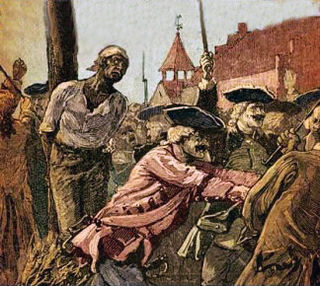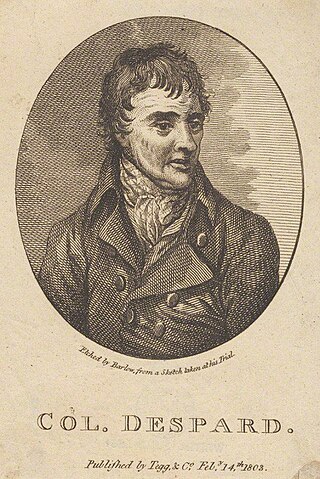
Peter Linebaugh is an American Marxist historian who specializes in British history, Irish history, labour history, and the history of the colonial Atlantic. He is a member of the Midnight Notes Collective.

Peter Linebaugh is an American Marxist historian who specializes in British history, Irish history, labour history, and the history of the colonial Atlantic. He is a member of the Midnight Notes Collective.
Peter Linebaugh was born in 1942 [1] He was a student of British labour historian E. P. Thompson, and received his Ph.D. in British history from the University of Warwick in 1975. [2] He has taught at University of Rochester, New York University, University of Massachusetts–Boston, Franconia College, Harvard University, and Tufts University. Linebaugh retired from the University of Toledo in 2014. [3]
Linebaugh's books have been generally well received within the discipline of history, and several of his books have demonstrated popularity among general readers. Historian Robin Kelley praised Linebaugh's most recent book, arguing in a review of The Magna Carta Manifesto (2008) that there is "not a more important historian living today. Period." [4]
In late April 2012, Occupy Ypsilanti published and began to distribute throughout Ypsilanti, Michigan, free of charge, Linebaugh's Ypsilanti Vampire May Day. His writing also appears in New Left Review , the New York University Law Review, Radical History Review , and Social History .
Linebaugh is married to Michaela Brennan. He has two daughters, Kate and Riley Linebaugh. [5]

Magna Carta Libertatum, commonly called Magna Carta, is a royal charter of rights agreed to by King John of England at Runnymede, near Windsor, on 15 June 1215. First drafted by the Archbishop of Canterbury, Cardinal Stephen Langton, to make peace between the unpopular king and a group of rebel barons, it promised the protection of church rights, protection for the barons from illegal imprisonment, access to swift justice, and limitations on feudal payments to the Crown, to be implemented through a council of 25 barons. Neither side stood behind their commitments, and the charter was annulled by Pope Innocent III, leading to the First Barons' War.
Civil liberties are guarantees and freedoms that governments commit not to abridge, either by constitution, legislation, or judicial interpretation, without due process. Though the scope of the term differs between countries, civil liberties may include the freedom of conscience, freedom of press, freedom of religion, freedom of expression, freedom of assembly, the right to security and liberty, freedom of speech, the right to privacy, the right to equal treatment under the law and due process, the right to a fair trial, and the right to life. Other civil liberties include the right to own property, the right to defend oneself, and the right to bodily integrity. Within the distinctions between civil liberties and other types of liberty, distinctions exist between positive liberty/positive rights and negative liberty/negative rights.

Edward Law, 1st Baron Ellenborough,, was an English judge. After serving as a member of parliament and Attorney General, he became Lord Chief Justice.
The Inclosure Acts,, cover enclosure of open fields and common land in England and Wales, creating legal property rights to land previously held in common. Between 1604 and 1914, over 5,200 individual enclosure acts were passed, affecting 28,000 km2.

The Conspiracy of 1741, also known as the Slave Insurrection of 1741, was a purported plot by slaves and poor whites in the British colony of New York in 1741 to revolt and level New York City with a series of fires. Historians disagree as to whether such a plot existed and, if there was one, its scale. During the court cases, the prosecution kept changing the grounds of accusation, ending with linking the insurrection to a "Popish" plot by Spaniards and other Catholics.
The commons is the cultural and natural resources accessible to all members of a society, including natural materials such as air, water, and a habitable Earth. These resources are held in common even when owned privately or publicly. Commons can also be understood as natural resources that groups of people manage for individual and collective benefit. Characteristically, this involves a variety of informal norms and values employed for a governance mechanism. Commons can also be defined as a social practice of governing a resource not by state or market but by a community of users that self-governs the resource through institutions that it creates.

Edward Marcus Despard, an Irish officer in the service of the British Crown, gained notoriety as a colonial administrator for refusing to recognise racial distinctions in law and, following his recall to London, as a republican conspirator. Despard's associations with the London Corresponding Society, the United Irishmen and United Britons led to his trial and execution in 1803 as the alleged ringleader of a plot to assassinate the King.

Silvia Federici is a scholar, teacher, and feminist activist based in New York. She is a professor emerita and teaching fellow at Hofstra University in New York State, where she was a social science professor. She also taught at the University of Port Harcourt in Nigeria. In 1972, with Mariarosa Dalla Costa and Selma James, she co-founded the International Feminist Collective, the organization that launched the campaign for Wages for Housework. In 1990, Federici co-founded the Committee for Academic Freedom in Africa (CAFA), and, with Ousseina Alidou, was the editor of the CAFA bulletin for over a decade. She was also a member of the Academic Association of Africa Scholars (ACAS) and among the voices generating support for the struggles of students across the African continent and in the United States. In 1995, in the course of the campaign to demand the liberation of Mumia Abu-Jamal, she cofounded the Radical Philosophy Association (RPA) anti-death penalty project, an organization intended to help educators become a driving force towards its abolition. From 1979 to 2003, she was a member of the Midnight Notes Collective.

The Charter of the Forest of 1217 is a charter that re-established for free men rights of access to the royal forest that had been eroded by King William the Conqueror and his heirs. Many of its provisions were in force for centuries afterwards. It was originally sealed in England by the young King Henry III, acting under the regency of William Marshal, 1st Earl of Pembroke.
The phrase law of the land is a legal term, equivalent to the Latin lex terrae, or legem terrae in the accusative case. It refers to all of the laws in force within a country or region, including statute law and case-made law.
Marcus Rediker is an American professor, historian, writer, and activist for a variety of peace and social justice causes. He graduated with a B.A. from Virginia Commonwealth University in 1976 and attended the University of Pennsylvania for graduate study, earning an M.A. and Ph.D. in history. He taught at Georgetown University from 1982 to 1994, lived in Moscow for a year (1984-5), and is currently Distinguished Professor of Atlantic History of the Department of History at the University of Pittsburgh.

The Battle of Fort Mose was a significant action of the War of Jenkins' Ear that took place on June 14, 1740 in Spanish Florida. Captain Antonio Salgado commanded a Spanish column of 300 regular troops, backed by the free black militia under Francisco Menéndez and allied Seminole warriors consisting of Indian auxiliaries. They stormed Fort Mose, a strategically crucial position newly held by 170 British soldiers under Colonel John Palmer. Palmer and his garrison had taken the fort from the Spanish as part of James Oglethorpe's offensive to capture St. Augustine.
The distribution of justice was a practice commonly adopted by pirates. Ships operated as limited democracies and imposed their ideas of justice upon the crew of the ship that they captured. After capture, the crew would be questioned as to whether they had suffered cruel or unjust treatment from the commander of the ship. Any commanders "against whom Complaint was made" would be punished or even executed. This punishment was not indiscriminately given to all ships' commanders. An "honest Fellow that never abused any Sailors" would be rewarded, and sometimes freed.
The title of The Woodcutter and the Trees covers a complex of fables that are of West Asian and Greek origins, the latter ascribed to Aesop. All of them concern the need to be wary of harming oneself through misplaced generosity.

The Despard Plot was a failed 1802 conspiracy by British revolutionaries led by Colonel Edward Marcus Despard, a former army officer and colonial official. Evidence presented in court suggested that Despard planned to assassinate the monarch George III and seize key strong points in London such as the Bank of England and Tower of London as a prelude to a wider uprising by the population of the city. The British Government was aware of the plot five months before the scheduled date of attack, but waited to arrest to gain enough evidence. One week before the scheduled attack, Despard and his co-conspirators were arrested at the Oakley Arms pub in Lambeth on suspicion of plotting an uprising. Despard's execution on 21 February 1803 was attended by a crowd of around 20,000, the largest public gathering until the funeral of Lord Nelson two years later following the Battle of Trafalgar.

Edward Palmer Thompson was an English historian, writer, socialist and peace campaigner. He is best known today for his historical work on the radical movements in the late 18th and early 19th centuries, in particular The Making of the English Working Class (1963).

Parliament in the Making was a programme of events organised by the Parliament of the United Kingdom to commemorate a series of anniversaries in 2015 including:

Hydrarchy, is the organizational structure of a ship, or the ability for individual(s) to gain power over land by ruling through the instrument of water, as defined by English poet Richard Braithwaite (1588-1673), who coined the term.
Dinah Black, also known as Dinah the Moor and Dinah the Black, was a Black woman who lived in the English city of Bristol during the 17th century and was baptised as a Christian. Though historical information on her life is scarce, records show that she visited Baptist spiritualist Sarah Wight in London in 1647 and appeared in a case heard by the Bristol Court of Aldermen in July 1667 after escaping from a ship which was supposed to transport her to a plantation overseas.